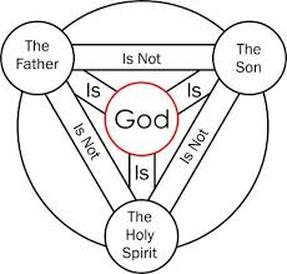|
Be forewarned that this post will be a little longer and somewhat more technical than many of my usual posts. I wanted to start to articulate my thinking on this subject, though (even though I'm late to the party), so here goes! :-) Happy reading! If you ever get overwhelmed by the length of this post or its content, click here for a light-hearted, humorous take on the Trinity! Depending on who you follow on social media and/or how attuned you are to theological news, you may be aware that in the last 6 weeks or so there's been a flurry of talk related to the Christian doctrine of the Trinity. (For a fuller review and summary - complete with who's involved and contributing, and a bunch of links so you can track the conversation - check out the summaries provided here and here over at The Cripplegate.) This "theological flurry" caught my attention as an evangelical Christian, because I worship God as triune and am therefore interested in discussion and theological refinement that may impact my worship (including renewed thinking, expression, and obedience). After all, thinking about and working to understand (what we can of) the Trinity is important! This "flurry" caught my attention as a pastor, because I'm confident there are some in Brookside's congregation that are aware of what's going on. Part of shepherding a flock includes theological care, and this discussion about the Trinity certainly falls within that category. And this "theological flurry" caught my attention as an adjunct professor at Grace University - where one of the classes I've taught is titled "Trinitarianism." (I've definitely got a lot more material for the next class when I include this recent debate!) The core of the back-'n-forth is around the issue of relationship between the persons of the Trinity. More specifically, the question seems to center around the intra-Trinitarian relationship between Father and Son. Most specifically, the debate rages over whether there is any sense in which the Son is functionally subordinate to the Father in His role. This subordination (or submission) applies not only to the incarnate Son while He's on earth, but is an eternal functional subordination (EFS), sometimes stated as a relationship of eternal relational authority-submission (ERAS). It must be noted that all sides agree that the persons of the Godhead share the same divine nature or essence. All are equally God. There is no subordination of nature, such that God the Father is "really God" and that the Son is "kinda God." (This is consistent with the 4th century articulation of Christian orthodoxy against the Arian heresy.) Again, this time with emphasis: Everyone has agreed that all persons of the Godhead are equally God. The Christian doctrine of the Trinity, however, maintains not only that all persons (Father, Son, and Holy Spirit) equally share the divine nature; it also maintains that there is a distinction in persons. The Father is not the Son, nor is the Son equated with the Father. In the same way, neither the Father nor the Son are the Holy Spirit. Equal in divine essence, distinct in personhood. This is the mystery of the Trinity, often illustrated with the graphic below. How we are to understand this "distinction of persons" is where there has been substantial disagreement. One side claims (as has been noted) that this distinction of persons allows for an eternal relationship of functional subordination within the triune Godhead. The other side firmly resists, asserting that ANY assertion of eternal subordination opens the door to Arianism or something like it. This debate has touched a number of nerves within the evangelical world. Not only does it attract all those who want to think closely about the triune God, many of those advocating for eternal functional subordination have connected this intra-Trinitarian relationship to a complementarian view of gender relationships (just as the Son relates to Father as equal in essence but submissive in function, so too this should influence gender relationships in the home and the church). This cursory (so much more could be said!) summary is hopefully a helpful initial orientation to what the debate centers around, and why evangelicals have chimed in passionately about it. Below I've included my initial take (at this point - the playing board continues to change!), and how I'm processing this current Trinitarian controversy. My "Bottom Line" Initial Take (at This Point)As with many debates, I don't side completely with one side against the other. Rather, there are things I want to say to each side and ask them to keep in mind. So too with this Trinitarian debate. (Here's where I nod to an early post by Michael Bird, and express gratitude for how his conclusions have stimulated my thinking on this in a helpful and edifying way.) To those that promote eternal functional subordination, I'm sympathetic to your view. (There, I've said it!) As I read Scripture, there seems to be some sense in which the Son - even before His incarnation - willingly proceeds from the sending of the Father as they pursued their one/united plan of redemption (Philippians 2:6-7). (I'm trying to be careful in my use of language here. We'll see if I'm successful!) And then even after the Son's ascension into heaven and His reign at the right hand of the Father, 1 Corinthians 15:24-28 indicates there is a future "handing over of the kingdom" and "subjection" (NIV) of the Son to the Father. It doesn't appear we can limit the functional subordination of the Son to only His time on earth. With all these affirmations, there are still some concerns and cautions I have with the EFS view. (Here's where I'm mostly echoing what Michael Bird has said at the end of this post.) First, I agree with those who say we need to find different language than "subordination." It smacks too easily of Arianism, and - however much it's nuanced - is still being misunderstood. Second, we must be careful about connecting a defense of complementarianism to the inner life of the Trinity - we must carefully articulate both if we should do so, and how we should do so. Now, to those who are concerned about/against any notion of eternal functional subordination. I'm grateful for your concern to think carefully about the persons of the Trinity, and to push those in the EFS camp to think about (and communicate!) their views carefully. Just because Arianism was denounced as a heresy centuries ago, this doesn't mean it can't pop up again in evangelicalism. We must stay vigilant, and maintain the "tri-unity" of the Trinity! But my request is that we also remain gracious - avoiding quick labels of heresy, and not acknowledging how those we disagree with nuance their own views. There's so much more that could be said. And, as always, the concern is that by not saying everything I want to say, I could be misunderstood. (If I wanted to take more time, I'd consider this debate through the lens of the "8 Things I'm Aiming for When I Teach." An exercise for another time, or something to think through on your own!)
Alas. Nevertheless, it's time to draw this post to a close (I've got other things to do today as well!) and see if this clarifies and/or contributes to the conversation.
2 Comments
8/13/2016 07:40:24 am
"avoiding quick labels of heresy"
Reply
Tim Wiebe
8/17/2016 12:50:34 pm
Thanks as always for checking in and contributing, Grant! I'm in agreement with you that the "heresy" label should be used cautiously. There ARE times it applies, but I think we need to make sure and have categories that show disagreement or concern without jumping immediately to heresy. I was surprised to see how quickly and cavalierly it's been used in this Trinity debate.
Reply
Leave a Reply. |
Tim WiebeChristian. Husband. Father. Pastor. Learner. Contributor. Reader. Categories
All
Archives
June 2024
|
© 2014-2024 | 11607 M Circle, Omaha NE, 68137 | www.thebrooksideinstitute.net



 RSS Feed
RSS Feed
